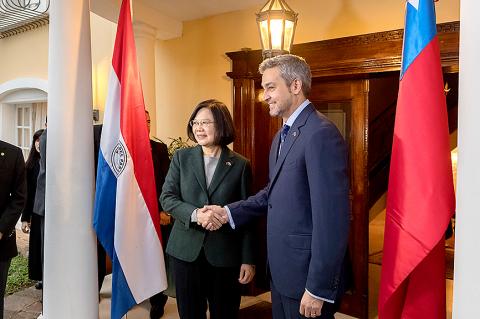President Tsai Ing-wen (蔡英文) on Tuesday arrived in Paraguay, where she and Paraguayan president-elect Mario Abdo Benitez agreed to further expand cooperation.
Tsai and Abdo Benitez agreed to focus on investment, infrastructure and trade as the focus of future relations, Hugo Saguier, a foreign affairs advisor to Abdo Benitez, said following the one-hour meeting.
Saguier, who attended the meeting, said that details of ventures between the two nations would be made public when Abdo Benitez visits Taiwan in October.

Photo courtesy of the Presidential Office
“After the meeting, we reconfirmed relations between the two nations,” Saguier said. “We will continue to maintain relations with Taiwan as the two nations share the same diplomatic values, which is irreplaceable to Paraguay.”
Under the framework, Taiwanese firms would be encouraged to invest in education, medical care and technology infrastructure projects in Paraguay to boost economic development and residents’ livelihoods, Ambassador to Paraguay Diego Chou (周麟) said.
Three government-funded investment firms would be started by Taiwan to offer Paraguay assistance on agriculture, technology and development projects through the provision of low-interest loans, said National Security Council Deputy Secretary-General Tsai Ming-yen (蔡明彥), who also attended the meeting.
Abdo Benitez promised to advance ties between the two nations in the hope that Paraguay might serve as a hub for Taiwanese manufacturers considering moving into the South American market, Tsai Ming-yen said.
Earlier on Tuesday, Tsai Ing-wen met Paraguayan President Horacio Cartes and gave a keynote speech at the opening of a course for students likely to study at a technology university jointly founded by the two nations, which has yet to officially open.
Tsai encouraged the students to apply to vocational training scholarship programs in Taiwan.
“Taiwan is Paraguay’s best friend,” she said. “We are glad to share our experience with you and contribute to a better future for Paraguay.”
Taiwan and Paraguay in December last year agreed to found the university to train engineers. Paraguay funded the construction, while Taiwan has provided teachers, curriculum plans and lab equipment.
Tsai Ing-wen invited Abdo Benitez to visit Taiwan in October and attend the Double Ten National Day celebrations, Tsai Ming-yen said, adding that the two sides would further discuss cooperative ventures in Taipei.
Later on Tuesday, Tsai Ing-wen attended a banquet with Guatemalan President Jimmy Morales, where they exchanged views on possible cooperative projects between the two nations.
Yesterday, she was to attend the inauguration of Abdo Benitez before heading to Belize for a three-day visit, during which she is to be decorated by Governor-General Colville Young and meet with Belizean Prime Minister Dean Barrow.
Asked about Tsai Ing-wen’s public address during her Monday stopover in Los Angeles, US Department of State spokeswoman Heather Nauert on Tuesday said: “Our policy on Taiwan has not changed. The United States remains committed to our US ‘one China’ policy based on the Three Joint Communiques under the Taiwan Relations Act.”
“The United States, in regard to this trip, facilitates from time to time representatives of the Taiwan authorities to transit the United States. Those are largely undertaken out of consideration for the safety and comfort of those travelers and that is in keeping with our ‘one China’ policy,” she said
Nauert declined to say whether the US government would be happy for Tsai Ing-wen to speak in Washington during a stopover.

SECURITY: As China is ‘reshaping’ Hong Kong’s population, Taiwan must raise the eligibility threshold for applications from Hong Kongers, Chiu Chui-cheng said When Hong Kong and Macau citizens apply for residency in Taiwan, it would be under a new category that includes a “national security observation period,” Mainland Affairs Council (MAC) Minister Chiu Chui-cheng (邱垂正) said yesterday. President William Lai (賴清德) on March 13 announced 17 strategies to counter China’s aggression toward Taiwan, including incorporating national security considerations into the review process for residency applications from Hong Kong and Macau citizens. The situation in Hong Kong is constantly changing, Chiu said to media yesterday on the sidelines of the Taipei Technology Run hosted by the Taipei Neihu Technology Park Development Association. With

CARROT AND STICK: While unrelenting in its military threats, China attracted nearly 40,000 Taiwanese to over 400 business events last year Nearly 40,000 Taiwanese last year joined industry events in China, such as conferences and trade fairs, supported by the Chinese government, a study showed yesterday, as Beijing ramps up a charm offensive toward Taipei alongside military pressure. China has long taken a carrot-and-stick approach to Taiwan, threatening it with the prospect of military action while reaching out to those it believes are amenable to Beijing’s point of view. Taiwanese security officials are wary of what they see as Beijing’s influence campaigns to sway public opinion after Taipei and Beijing gradually resumed travel links halted by the COVID-19 pandemic, but the scale of

A US Marine Corps regiment equipped with Naval Strike Missiles (NSM) is set to participate in the upcoming Balikatan 25 exercise in the Luzon Strait, marking the system’s first-ever deployment in the Philippines. US and Philippine officials have separately confirmed that the Navy Marine Expeditionary Ship Interdiction System (NMESIS) — the mobile launch platform for the Naval Strike Missile — would take part in the joint exercise. The missiles are being deployed to “a strategic first island chain chokepoint” in the waters between Taiwan proper and the Philippines, US-based Naval News reported. “The Luzon Strait and Bashi Channel represent a critical access

Pope Francis is be laid to rest on Saturday after lying in state for three days in St Peter’s Basilica, where the faithful are expected to flock to pay their respects to history’s first Latin American pontiff. The cardinals met yesterday in the Vatican’s synod hall to chart the next steps before a conclave begins to choose Francis’ successor, as condolences poured in from around the world. According to current norms, the conclave must begin between May 5 and 10. The cardinals set the funeral for Saturday at 10am in St Peter’s Square, to be celebrated by the dean of the College